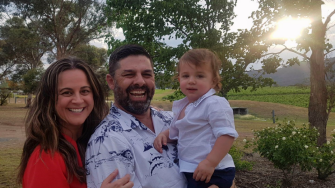
More doors opened to me because I was taught by UNSW academics who provoked critical thinking and allowed me to think outside of the square, says alumna Samantha Joseph.
Alumna Samantha Joseph is passionate about creating change for the disadvantaged. Samantha has been an active member of our alumni community, contributing extensively to UNSW’s mentoring programs. With the recent launch of the UNSW Career Discovery Mentoring Program, I caught up with Samantha to learn more about her journey, the impact she is making in her field and how she is staying connected to UNSW.
1. Why did you want to study law at UNSW?
I witnessed a family member go through the family court system and saw how this so-called notion of ‘justice’ we assume protects all, offered her no special privileges, though she was raising a mob of kids and making selfless sacrifices. I wanted to study law to be able to support the ‘underdog’ – so those oppressed could be heard – and influence the systems in place to be more responsive and accountable.
I remember learning at UNSW that there is no such thing as ‘justice’; rather there is a winner and loser. I saw this happen and still see it, and I wanted the tools and ability to contribute in some meaningful manner to enable change. UNSW’s reputation as one of the best law schools in Australia would and could make this happen!
2. Tell us about your professional journey since graduating from UNSW Law & Justice?
I’ve had a diverse and interesting professional journey. I consider myself fortunate to have attained a law degree to make my vision for wanting to study law a reality! I have worked across the public, commercial and not for profit sectors. I’ve worked as a lawyer in the community and public sectors, management roles in several Aboriginal peak bodies advocating for critical change for Aboriginal people in NSW across a range of fields, managing the design and implementation of strategies and programs following large scale government reform to improve the NSW child protection system; and working in the policy unit at the Royal Commission into Institutional Child Sexual Abuse examining how effective the broader service system was in responding to the needs of victims and survivors.
3. How have you stayed connected with UNSW since graduating?
I have maintained connection in a variety of ways. One example is participating in several mentoring programs, providing guidance and support to law students. It’s inspiring to hear the stories and motivations from the students I mentored who will go on to shape the future of the legal profession.
I also wrote articles for the Indigenous Law Bulletin and was an editorial panellist for the Indigenous Law Reporter. I like to keep up to date with what’s going on at UNSW via e-newsletters and attending events.
4. Has UNSW been able to support your career development since graduating?
Sure has! Fresh out of university, I had no idea what to do or where I was heading professionally. My first job as a graduate was as an Aboriginal Solicitor at the Arts Law Centre of Australia (the national community legal centre for the arts). I had not studied intellectual property and had no understanding of it conceptually except that the university textbook cover was brown. This role proved amazing and by far offered me some of the best professional experiences. My role involved legal advice, advocacy and education. I travelled nationally, including to very remote Aboriginal communities where I gained experiences and insights that were beyond professional.
Slowly, one door opened followed by another and years later I look back and think wow, what a great ride! This was made possible because I was taught by UNSW academics who provoked critical thinking and allowed me to think outside of the square. I enrolled in subjects that reflected my interest in social justice – an area I continue to commit my energy to today, to ensure we live in a society that allows the voiceless to be heard by overhauling the systems that have oppressed so many.
